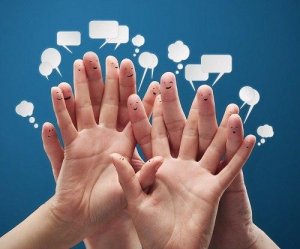I Have No Social Skills, What Should I Do?

Although social skills don’t have a clear definition, everyone talks about them. Social skills are a set of behaviors that help us interact with others, and that we tend to learn by imitation. They make up the way we act around other people, and they can be seen in the way we handle ourselves in a meeting or when we start up a conversation with a stranger.
Social skills are strongly linked to psychology, and therefore can be addressed in therapy. As a first step, however, it’s worth having a clear understanding of what they are before determining that you don’t have any. There’s no need to be that pessimistic!
What are social skills?
Social skills have been psychologically studied and analyzed for decades. In fact, the first investigation into the subject dates back to 1949. Thanks to those years of study, we’re now able to classify social skills into the following groups:
- First group: Here you find the most basic skills like listening, starting and maintaining a conversation, expressing gratitude, asking questions, introducing yourself and others, having a dialogue, showing empathy, and giving compliments.
- Second group: These are advanced social skills, like giving and following instructions, asking for help, apologizing, participating, expressing your opinion, and convincing others.
- Third group: These are abilities related to how we feel. In this category you find recognizing and expressing your own feelings, understanding other people’s feelings, showing affection, confronting other people’s anger, self-compensating, and resolving fears.
- Fourth group. These are skills related to self-control, like asking for permission, helping, sharing, loving, negotiating, responding to jokes, defending your rights, avoiding problems with other people, and refraining from fighting.
- Fifth group. In the last group, you can find skills that help you deal with stress, including formulating and responding to complaints; dealing with embarrassment; handling persuasion, accusations, and failure; defending someone; managing contradictory messages; preparing yourself for a difficult conversation; and facing pressure.

Empathy and social skills
Once again, we’re faced with a word that we might not use very often, but that we experience all the time. Empathy has to do with understanding what the other person feels – in their circumstances, from their point of view – and acting accordingly. Contrary to what some people think, it doesn’t mean “treating others the way you would want to be treated,” because fortunately, everybody wants different things.
Your level of empathy doesn’t always depend on what you were taught. Nor is it an innate characteristic that you inherited when you were born. It is thought that women are more empathetic than men because they have to understand what their children want when they’re little. So it seems like women have a more developed sensitivity for social contact because it was an important factor in natural selection.

Empathizing with the other person is the first step towards making them feel comfortable with the interaction. If you start to be more empathetic, you’ll get along better with people, be more persuasive, make yourself listen better, have more motivation, and understand what happens to others better.
How are your social skills?
Now let’s set aside the theory and go straight into practice. This is the most complicated part, but it’s worthwhile. Try the following techniques to be more socially capable:
- Pay attention to the tone of voice, posture, gaze, and even silences of your interlocutor. All this information is at your disposal, so it’s worth knowing how to use it in your favor.
- Imagine what might be motivating the other person. How do you think they would move forward if they had a problem?
- Get the other person to do their part. Ask “how are you?” and allow them to respond openly. Act interested in what they’re saying.
- Don’t make conclusions. Avoid phrases like “your problem is…” or “you were wrong to…” because then they’ll close off, thinking you’re about to give them a lecture.
- Rephrase your words and phrases so that your interlocutor feels understood. “I think that situation is influencing your mood,” “It seems like you have a real reason to feel tired,” etc.
- Put yourself in other people’s shoes. Make an effort to leave your own little bubble and try to think like the person you’re talking to for a minute.
If you improve your social skills, soon you’ll notice your relationships improving. Be sure to appreciate how rich and abundant they become. Not only will they lead to improvement in your personal social circle, but they’ll also help you out at work!
Use the Hanlon Principle to Communicate Better on Social Networks
Although social skills don’t have a clear definition, everyone talks about them. Social skills are a set of behaviors that help us interact with others, and that we tend to learn by imitation. They make up the way we act around other people, and they can be seen in the way we handle ourselves in a meeting or when we start up a conversation with a stranger.
Social skills are strongly linked to psychology, and therefore can be addressed in therapy. As a first step, however, it’s worth having a clear understanding of what they are before determining that you don’t have any. There’s no need to be that pessimistic!
What are social skills?
Social skills have been psychologically studied and analyzed for decades. In fact, the first investigation into the subject dates back to 1949. Thanks to those years of study, we’re now able to classify social skills into the following groups:
- First group: Here you find the most basic skills like listening, starting and maintaining a conversation, expressing gratitude, asking questions, introducing yourself and others, having a dialogue, showing empathy, and giving compliments.
- Second group: These are advanced social skills, like giving and following instructions, asking for help, apologizing, participating, expressing your opinion, and convincing others.
- Third group: These are abilities related to how we feel. In this category you find recognizing and expressing your own feelings, understanding other people’s feelings, showing affection, confronting other people’s anger, self-compensating, and resolving fears.
- Fourth group. These are skills related to self-control, like asking for permission, helping, sharing, loving, negotiating, responding to jokes, defending your rights, avoiding problems with other people, and refraining from fighting.
- Fifth group. In the last group, you can find skills that help you deal with stress, including formulating and responding to complaints; dealing with embarrassment; handling persuasion, accusations, and failure; defending someone; managing contradictory messages; preparing yourself for a difficult conversation; and facing pressure.

Empathy and social skills
Once again, we’re faced with a word that we might not use very often, but that we experience all the time. Empathy has to do with understanding what the other person feels – in their circumstances, from their point of view – and acting accordingly. Contrary to what some people think, it doesn’t mean “treating others the way you would want to be treated,” because fortunately, everybody wants different things.
Your level of empathy doesn’t always depend on what you were taught. Nor is it an innate characteristic that you inherited when you were born. It is thought that women are more empathetic than men because they have to understand what their children want when they’re little. So it seems like women have a more developed sensitivity for social contact because it was an important factor in natural selection.

Empathizing with the other person is the first step towards making them feel comfortable with the interaction. If you start to be more empathetic, you’ll get along better with people, be more persuasive, make yourself listen better, have more motivation, and understand what happens to others better.
How are your social skills?
Now let’s set aside the theory and go straight into practice. This is the most complicated part, but it’s worthwhile. Try the following techniques to be more socially capable:
- Pay attention to the tone of voice, posture, gaze, and even silences of your interlocutor. All this information is at your disposal, so it’s worth knowing how to use it in your favor.
- Imagine what might be motivating the other person. How do you think they would move forward if they had a problem?
- Get the other person to do their part. Ask “how are you?” and allow them to respond openly. Act interested in what they’re saying.
- Don’t make conclusions. Avoid phrases like “your problem is…” or “you were wrong to…” because then they’ll close off, thinking you’re about to give them a lecture.
- Rephrase your words and phrases so that your interlocutor feels understood. “I think that situation is influencing your mood,” “It seems like you have a real reason to feel tired,” etc.
- Put yourself in other people’s shoes. Make an effort to leave your own little bubble and try to think like the person you’re talking to for a minute.
If you improve your social skills, soon you’ll notice your relationships improving. Be sure to appreciate how rich and abundant they become. Not only will they lead to improvement in your personal social circle, but they’ll also help you out at work!
Use the Hanlon Principle to Communicate Better on Social Networks
This text is provided for informational purposes only and does not replace consultation with a professional. If in doubt, consult your specialist.







